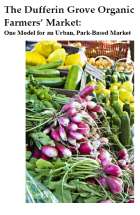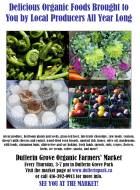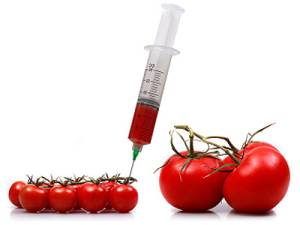
Pages in this Folder:

Related Folders:
See also Department Site Map
Publications:
Market-related videos
Comments?
For the basics, see
- Website & Privacy Policies
- How To Get Involved
- The Role of the Park
Search options:
Department Site Map
Custodians:
posted on July 21, 2008
GMOs - Just Say No
By: Doug DiPasquale
Posted: Jun 30th 2008 5:12PM
I came across a fantastic site recently that really helps to elucidate the issue with genetically modified foods. There is a ton of information on this site, and I quote liberally from it below. I figured I would draw your attention to the site and use it as an opportunity to discuss an important topic.
But first, a little bit about GMOs. Genetically Modified Organisms, or GMOs (also called Genetically Engineered Organisms, or GEOs) are plants or animals that have been altered at the genetic level by having foreign DNA inserted into their natural DNA strand. The result is that new properties are derived in the plant or animal that never previously existed. This should not be confused with natural breeding processes that have existed on this planet since life began and that we humans have perfected over millions of years. Genetic Modification is defined as "the altering of the genetic material in [an] organism in a way that does not occur naturally by mating or natural recombination or both".
It is an exciting new science, to be sure. But the question arises - are these genetically altered foods safe? Lets not forget that we are introducing species here that have never before existed on this planet. Have we really taken the necessary precautions and thought about the possible consequences?
It's important to note that when we consume GMOs, and most of us are on a daily basis, we are taking part in an experiment. These foods, which no organism on earth has ever previously been exposed to in our entire history, have not undergone human trials. In most cases, they haven't even undergone animal trials. Society at large is the testing ground, an idea that personally I am not comfortable with. And what's worse is that Canada continually rejects moves to issue mandatory labeling of products containing genetically engineered material, making it impossible to opt out of the experiment if one so chose. According to our government, we don't have the right to know what we're feeding our families.
It would be one thing if we were dealing with an exact science here, one in which the scientists involved had no reason to doubt the effects of consuming these foods - but we're not dealing with an exact science.
In fact, GMOs can have unpredictable and hard to detect side effects. Various departments and experts spelled these out in detail almost two decades ago when GMOs were first being considered for introduction into the food chain. They listed possibilities of toxins, allergies, nutritional defects and new diseases as potential unexpected outcomes.
Despite this, these foods have been allowed onto our dinner tables without any regulation since 1992. The government's position is that they are "substantially equivalent" to their natural counterparts, despite widespread feeling in the scientific community that vigorous scientific testing is necessary before introducing these organisms into the food chain. The Royal Society of Canada described "substantial equivalence" as "scientifically unjustifiable and inconsistent with precautionary regulation of the technology."
"But even if we disregard unexpected changes in the DNA for the moment, a proper functioning inserted gene still carries significant risk. Its newly created GM protein, [...] may be dangerous for human health. Moreover, even if that protein is safe in its natural organism, once it is transferred into a new species it may be processed differently. A harmless protein may be transformed into a dangerous or deadly version. This happened with at least one GM food crop under development, GM peas, which were destroyed before being commercialized." I included this quote because it elucidates one of the many possibilities for things to go wrong in genetic engineering; possibilities that, should they come to pass, may not be noticed until it's too late.
Even if there is the potential for good in genetic engineering, we're not seeing it on the shelves. Rather than having vitamin-fortified foods or plants able to grow in the desert to stave off famine, we have plants that are unnaturally resistant to specific herbicides, which are conveniently manufactured by the same biotech companies producing the GMOs, allowing farmers to wipe out everything on their fields except for the crops (which will now contain even greater concentrations of the poison). Other pursuits, although currently enjoying a global moratorium, are terminator seeds, seeds that produce only sterile plants, forcing farmers to buy new seeds every year (incidentally, Canada is one of the countries trying hard on the world stage to have the moratorium lifted - I'm glowing with pride). I fail to see how these advances are benefiting anyone but the biotech companies who have introduced them.
It comes down to responsibility. If we're going to be introducing these foods into our diets we need to do so in a responsible manner. Rigorous testing needs to be undergone by a third party with no vested interest in the outcome. Precautions have to be taken to ensure that these GMO don't intermingle in existing ecosystems, tainting the delicate balance with possible dire consequences. This being said, I'm not holding my breath.
So once again, it is left up to the individual to be vigilant and avoid the toxic material alowed onto the grocery store shelves through corruption and greed. But, without any type of labelling you can never be sure what you're eating. The best way to avoid these "frankenfoods" is to buy organic, but even this isn't foolproof. Although organic foods are, by definition, GMO free, more and more cases of cross-polination (where pollen from GMOs travels on the wind to organic fields and intermingles with the organics) are being discovered all the time. Truthfully, we crossed a line the first time a GMO was let out of the lab. But continuing to buy organic will, at the very least, not support this biotech industry. Voting with our dollars is always a viable strategy.
The Healthy Foodie is Doug DiPasquale, Holistic Nutritionist and trained chef, living in Toronto. You can email him with questions at dugdeep@gmail.com.
|
Read more News. | ||





 Printer friendly version
Printer friendly version
